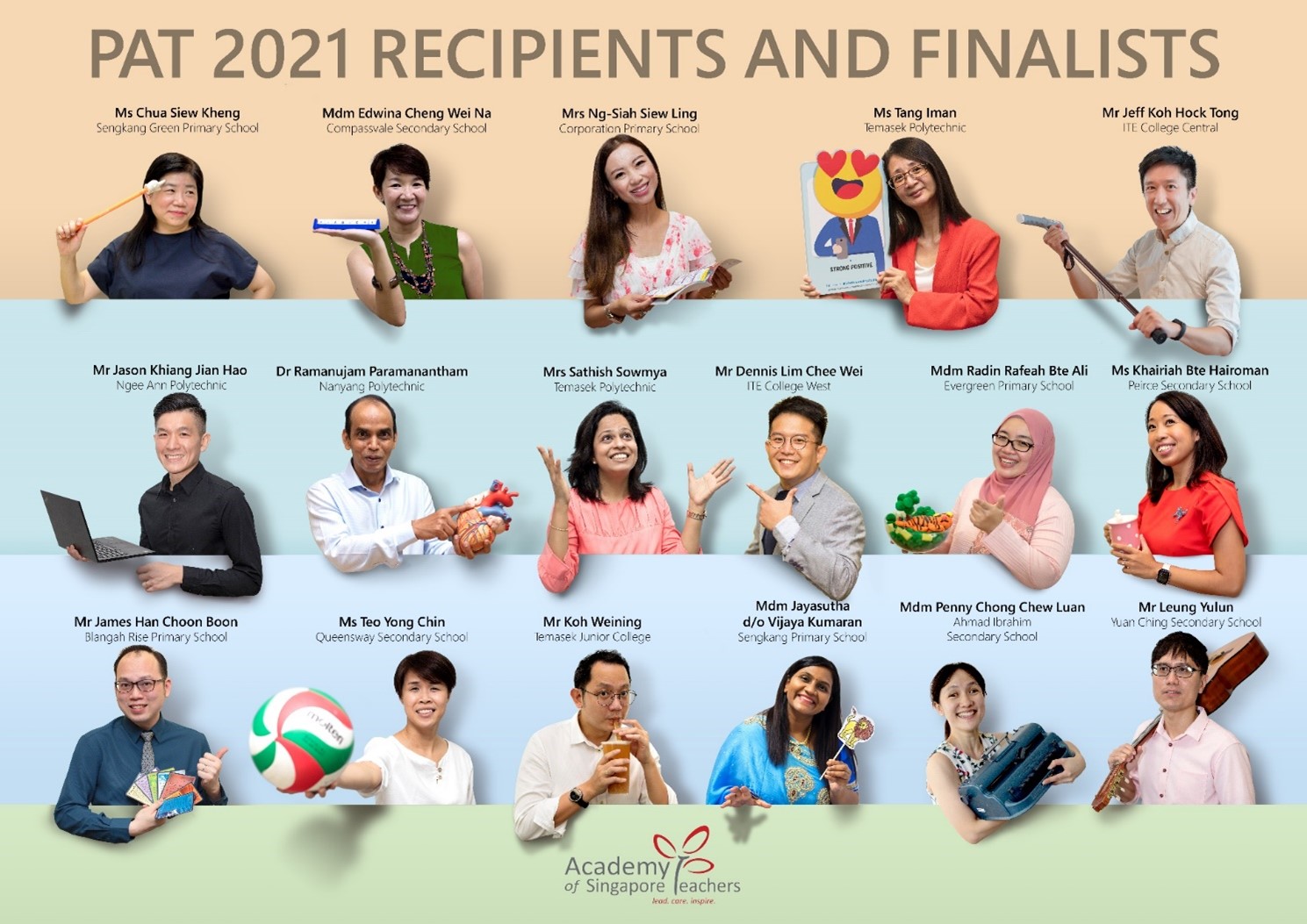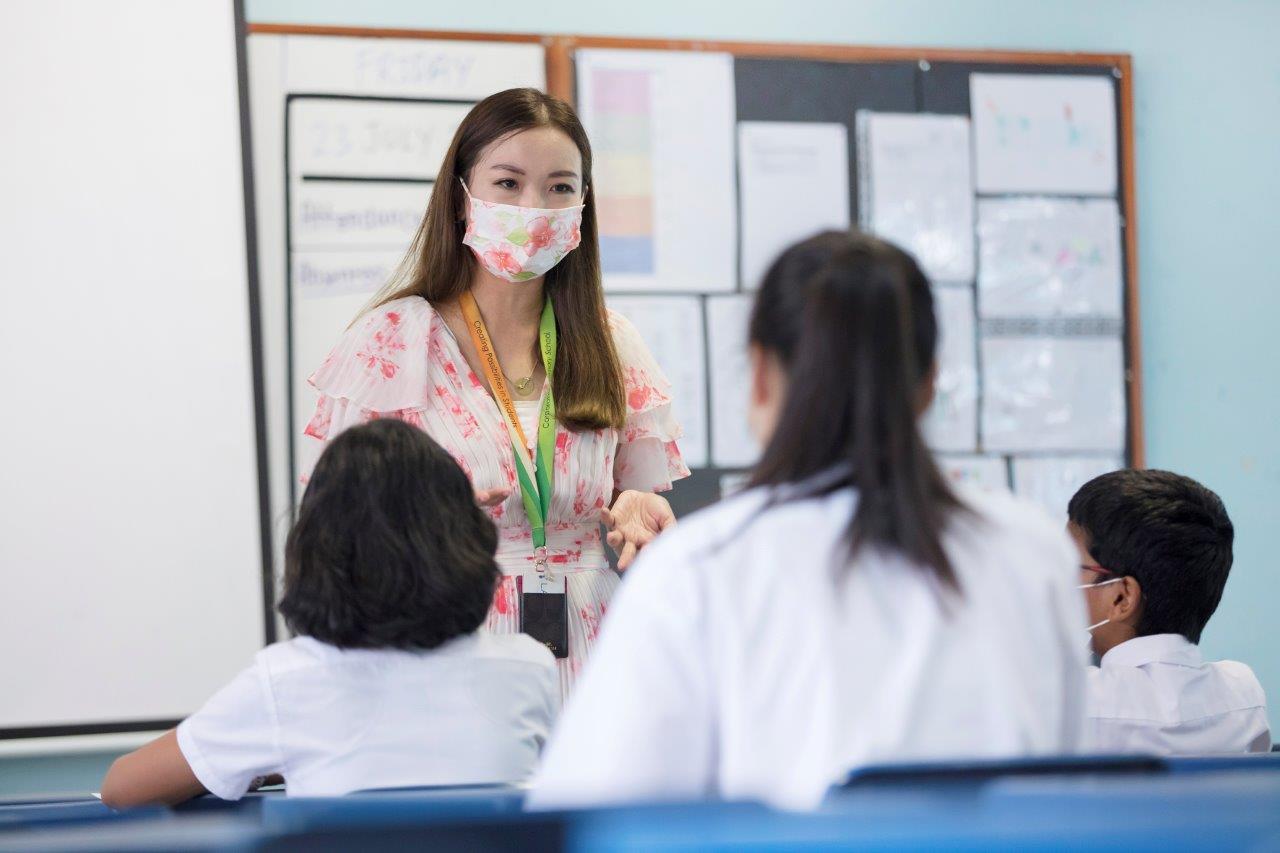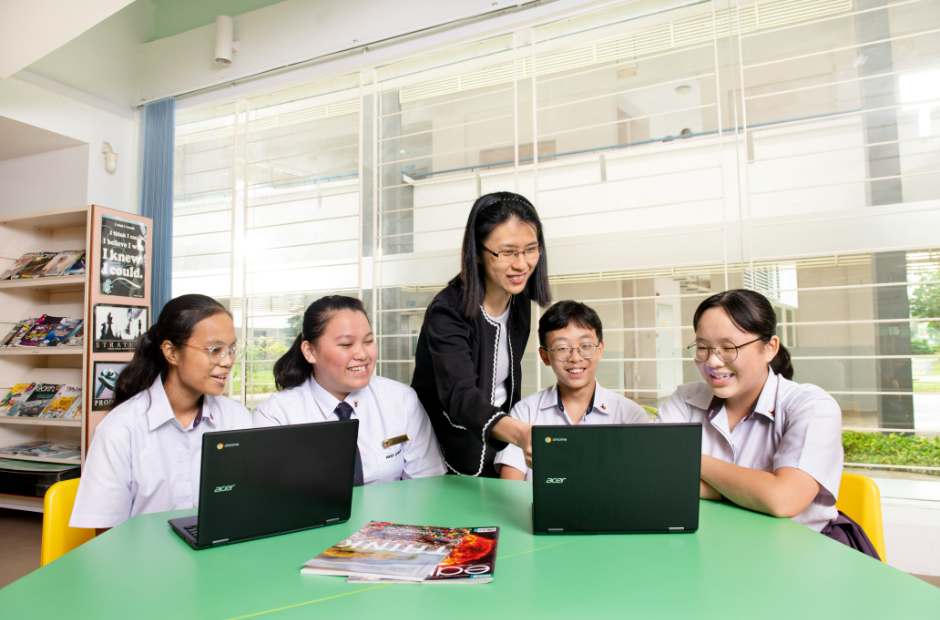Ng-Siah Siew Ling, Corporation Primary, President’s Award for Teachers 2021 Recipient
One thought-provoking question; a flurry of ideas and activities. This is the magic that happens when you light that spark for inquiring young minds. For Ng-Siah Siew Ling, the question that got her class all excited was: “Do you think animals should be kept in captivity?”
This question, meant to be a lesson for English Oral practice, captured the students’ imagination, and Siew Ling was quick to maximise the learning opportunities presented.
Students debated passionately about animal rights, they wrote pieces, created posters, and discussed attendant issues, like poaching and endangered animals. Students went on to do their own research as well.
“There was so much thinking and deep learning going on,” said Siew Ling.
Posing open-ended, thought-provoking questions to inquisitive young learners is a conscious move on Siew Ling’s part to build her students’ oracy and thinking skills. It is also based on the premise that students learn best in teams, where they can tap the rich diversity of ideas and talents of every member to debate and resolve an issue.
The success of this particular lesson caught the attention of the Harvard Graduate School of Education, where Siew Ling was doing a course, and they asked to use it as a model in their outreach for teachers.
“It started from just one simple question,” recalled Siew Ling. “The question is very important, to serve as a springboard to multiply learning.”
Learning the “moves” to Talk
Siew Ling’s students’ ability to fluently articulate their opinions and thoughts did not come about by accident.
As an English teacher for the past 16 years, Siew Ling has been putting the knowledge gleaned from her professional training courses into practice. One such technique is the ‘Talk Moves’ placemat developed by the English Language Institute of Singapore. Students are guided to ask probing questions through ‘Talk Moves’, or conversational prompts and sentence starters. These conversational cues progress in stages of increasing difficulty from the Lower Primary to Upper Primary levels.
Observing that the younger students could use only the first three stages, Siew Ling and her colleagues developed an expanded placemat with easier “moves”. With the customisation, the Lower Primary students were able to ask better questions and give more insightful answers.
Siew Ling shared the English Department’s success with the other teachers. Inspired by how the initiative sharpened the students’ verbal and thinking skills, her Mother Tongue colleagues created Chinese, Malay and Tamil versions of the technique and saw much progress in their students’ conversational skills.
Creating opportunities for students to shine
The students’ language fluency skills were put to the test when Siew Ling tasked her Primary 6 students to publish a book to commemorate the school’s 45th Anniversary. It turned out to be the right decision and a perfect talent showcase.
The publication team, comprising students drawn from different classes, rose to the occasion, pitching their theme to the Principal and conceptualising the stories. In teams of three, they photographed, filmed and interviewed over 20 school stakeholders, including current and ex-school staff, parents and alumni.
Like any major project, there were moments when it was hard to tell how things would turn out. On the day of a particular interview, for instance, a last-minute turn of events kept Siew Ling out of the video call, and the student team had to conduct the entire interview by themselves. Their confidence and professionalism impressed the interviewee so much that she called Siew Ling after the session to praise them.
After eight months of hard work, with the students constantly juggling their studies and publication duties, the book was produced. It was an engaging read, filled with creative features like poems, “Instagram stories” and hand-drawn comic strips. Besides English articles, the students also showed off their flair for their Mother Tongues with stories and poems in Chinese, Malay and Tamil.
Siew Ling said with pride, “We teachers don’t always need to be there. The students are able to take charge of their own learning. Children have diverse talents, so when you give them the right opportunity for growth, they will unleash their potential.”
She shared an example of a group of students, who were struggling academically. They had lost their confidence and were unmotivated. Siew Ling got them to do some journaling and realised that they loved photography. So, she arranged for a mini workshop on photography and videography, and got them involved in the publication. “They really grew. They were involved in this big project, so they really wanted to learn. When they did an oral presentation in class, they spoke up and received a standing ovation.”
As Siew Ling said, “Every child has their own talent and their potential. It is for the teacher to find what these talents are, to help them discover them so that they can unleash their potential. I tell myself: You only have one chance to work with them. Cherish this moment. Make it a meaningful and memorable learning process, so that they continue to love learning in secondary school when they move on.”
Helping other teachers teach and learn
Siew Ling is always on the look-out for new and better ways to help her peers learn as well. As the school staff developer and head of department, she looks into the training needs of teachers, admin staff and executives.
One pedagogical tool that she has helped her school embrace is Lesson Study. Unlike Lesson Observation, which assesses the teacher’s classroom performance, Lesson Study focuses on how students learn. Making detailed observations of how their students respond to customised lessons has enabled Siew Ling and her colleagues to identify teaching strategies that work. It also benefits the school’s teaching culture.
“Our teachers have become a learning community. They actively come together to develop curriculum materials and to craft out research studies. The quality of my teachers’ conversation has also changed.”
Using Lesson Study has earned Corporation Primary School recognition among international educators. The school has been invited to share their teaching research projects every year at the World Association of Lesson Study conference since 2018.
Another unexpected avenue to help teachers learn came from Siew Ling’s appointment as an Official Assessor with Enterprise Singapore. Her then principal had told her about the opening and encouraged her to take up the role.
To Siew Ling, it was an opportunity to expand her horizons beyond the education sector. She felt that it might provide lessons useful to her teaching role. As an Assessor, she had to accredit companies which demonstrate business excellence in their daily operations. It exposed her to various corporations’ best practices and the skills that were in demand outside of school.
Eager to share her experience, Siew Ling tapped the industry connections made through the experience and organised learning visits to well-known companies such as 3M, Sheng Siong and Mount Alvernia Hospital for her fellow teachers. Her purpose? To give educators an insight into the kind of knowledge and skills desired in the working world, so that they could better prepare students for it.
Such industry visits were eye-opening experiences for the teachers. The outcome was a school-wide plan to build skillsets like creativity, effective communication and collaborative teamwork in students.
In Siew Ling’s view, it is vital that teachers be constantly learning in order to keep abreast of new ways of teaching.
“It is through our collective learning that we strengthen our pedagogy and nurture our learners. Learning is the bridge from who you are now to who you want to become.”





.jpg)
.jpg)
